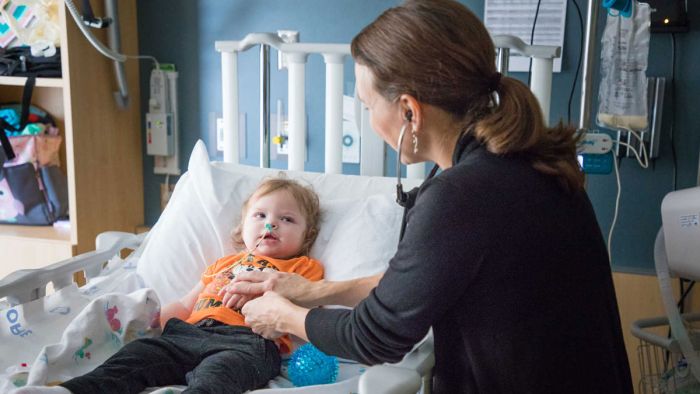Acute Flaccid Myelitis (AFM) continues to stay top-of-mind as cold and flu season approach. When AFM peaked in 2018, most patients were presenting with sudden onset of limb weakness after a respiratory illness or fever. Early diagnosis and treatment of AFM’s symptoms can have a significant impact on recovery.
In 2018, the United States reported 238 cases, with over 60 percent of children experiencing weakness in at least two limbs. According to research done by the CDC, motor function deficits are still prevalent in 75% of AFM patients after treatment. Depending on the severity of symptoms, a combination of rehabilitative medicine and surgical interventions may be needed to regain even partial motor function.
How is AFM Treated?
Gillette Children's is widely recognized for its expertise in treating complex and rare conditions, including AFM. In fact, most Minnesota children diagnosed with AFM during the latest outbreaks received care from Gillette. In addition to providing the region’s most comprehensive pediatric rehabilitative medicine program, we offer the latest AFM surgical treatment, nerve transfer surgery. This procedure involves transferring nearby functioning nerves to the paralyzed nerve, supplying new nerve signals to the damaged area. This surgery can potentially restore function in select patients. The recovery is slow and requires a great deal of therapy post-surgery.
Pediatric orthopedic hand surgeon, Ann Van Heest, MD, has been performing nerve transfer surgery for 10 years.
“Besides our experienced team, Gillette stands apart from other health care centers because we use an inter-operative EMG." "The EMG is an electromyogram that uses electrodes to track electrical activity within muscles and nerves."
Ann Van Heest, MD
“The most important part of nerve transfer surgery is to know the quality of the nerve you’re transferring and that’s when experience and the EMG can really help,” Van Heest explains. “Once a nerve is transferred patients have that area immobilized for about a month. Then they have six months or more of rehabilitation.”
Consult with a Specialist at Gillette Children's
Early treatment is key to minimizing AFM’s effects on motor function. Gillette’s team of experts in treating patients who have AFM includes a neurosurgeon, rehabilitation medicine specialist, neurologist, and specialized occupational therapists. Dr. Van Heest and the team are available anytime for consultation and urgent referrals by calling 651-325-2200.
Get Partners in Care Stories in your inbox!
Subscribe to Partners in Care Journal, a newsletter for healthcare providers and community health professionals.
Subscribe Today Home Page
Home Page



